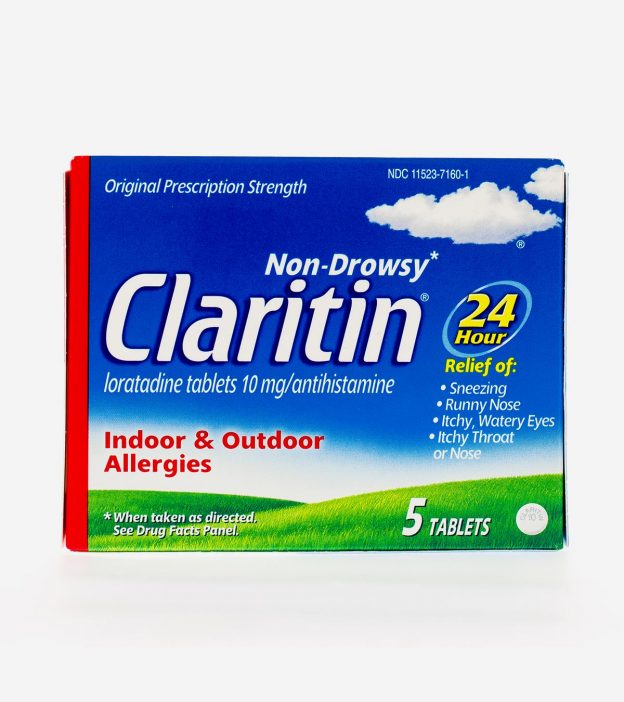Is Claritn Safe for Breast Feeding Moms

Image: Keith Homan / Shutterstock
Loratadine, commonly known by the trade name — Claritin, is a OTC medicine that is used to temporarily relieve the symptoms of hay fever or other allergies such as sneezing, runny nose, and itchiness of the eyes, nose, and throat. But is Loratadine on breast milk safe? It may help to know that while it helps relieve the symptoms mentioned above, it does not help manage hives or other skin allergies (1). Read this post to know more about the benefits, safety, and side effects of loratadine for breastfeeding mothers.
Is Loratadine Safe While Breastfeeding?
Yes, it is safe but within limits. As per the recommendations of the British Society for Allergy and Clinical Immunology's, loratadine can be taken at its lowest dose during breastfeeding (2).
Loratadine passes into the breast milk in low amount but has minimal sedative effect.
The ingredients of Claritin and Claritin-D are safe while breastfeeding.
However, the doctor may not recommend loratadine during breastfeeding if the baby has low birth weight, was born prematurely or has health issues (3).
Your health condition is important too: If you have liver or kidney disease, inform about it to the physician before he prescribes the medication.
Even if you and your baby do not have any health conditions, you have to limit your intake of loratadine to small amounts as it enters the breast milk.
How Much Loratadine Does Breast Milk Absorb?
Six women were studied to understand the impact. When they took a single oral dose of 40mg, average peak milk level of 29.2mcg/L occurred two hours after the dose was taken.
Desloratadine is a major metabolite of loratadine. At 5.3 hours after the dose, 16mcg/L desloratadine occurred in peak level in milk. Over 48-hour time, a total of 11.7mcg of loratadine and its metabolite were excreted in the milk.
However, the dose taken by the women was four times more than the usual dose. And thus, with 10mg dose, a total dose of 3mcg would be expected in the breast milk (4).
The little amount of the drug that seeps into your breast milk may not have any adverse effects. But higher doses can prove to be troublesome.
Effect Of Loratadine On Breastmilk
If antihistamines are taken in relatively higher doses, the basal serum prolactin could decrease in non-lactating women and early postpartum women. But antihistamines do not affect the suckling-induced prolactin secretion. So, in a mother with established lactation, prolactin levels may not affect her breastfeeding ability (5).
In another study, one out of 51 nursing mothers, who were on 10mg loratadine for less than a week at four months postpartum, reported a decrease in the milk production.
If you notice any decrease in lactation while on Loratadine, talk to your doctor.
Note: Claritin-D has the decongestant pseudoephedrine, which is categorized as 'moderately safe' during lactation (6). However, some lactation experts opine that it can have a major negative effect.
Does Loratadine Impact Nursing Infant?
According to a survey conducted by Teratogen Information Service on 51 nursing mothers, who were on loratadine and had infants over two months old, two mothers reported minor sedation in their babies.
These mothers were on the medication for one week or less and took a dose of 10mg each day. Other developments in babies, such as psychomotor skills and weight gain, were on par with the other infants in the control group, who were not exposed to the drug.
In an extension of the study, the researchers did not find differences in sedation or any other side effects in the infants of the mothers who took loratadine and those who did not (7).
It is a good idea to observe your baby while you are on this medication. Check if your little one displays symptoms like a rash or noticeable changes in her behavior such as heightened fussiness or irritability or sudden changes in her appetite or sleeping pattern. Always observe for sedation and dry mouth.
Side Effects Of Loratadine While Breastfeeding
Loratadine usually produces no harmful side effects. But contact your doctor if you notice any unusual reactions in your body. Also, consult your doctor about any possible side effects of loratadine before you consume it. Prior information helps you prepare for any adverse reactions such as:
- Sedation
- Nausea
- Diarrhea
- Fatigue
- Headache
- Mouth sores
- Dry mouth
- Nosebleed
- Itchy eyes
- Sleep troubles
Seek medical advice if you experience any severe allergic reactions after using loratadine, such as:
- Severe dizziness
- Rashes
- Swelling of lips, face, throat, eyes or tongue
- Difficulty in breathing
- Itchiness
On the bottom line, loratadine is safe to use while breastfeeding. But, try harmless remedies such as steam inhalation or anti-inflammatory herbs.
If your doctor prescribes loratadine while breastfeeding, keep a watch on the side effects. Ask your doctor about the best time to take loratadine. For instance, you can take it just after nursing your baby to minimize her exposure to the drug.
Did you suffer from any allergies when you were breastfeeding? How did you overcome them? Share your experiences in the comment section.
References:
MomJunction's articles are written after analyzing the research works of expert authors and institutions. Our references consist of resources established by authorities in their respective fields. You can learn more about the authenticity of the information we present in our editorial policy.
- Loratadine.
https://medlineplus.gov/druginfo/meds/a697038.html - R J Powell et al.; (2015); BSACI guideline for the management of chronic urticaria and angioedema.
https://pubmed.ncbi.nlm.nih.gov/25711134/ - Antihistamines.
https://www.nhs.uk/conditions/antihistamines/. - J Hilbert et al.; (1988); Excretion of loratadine in human breast milk.
https://pubmed.ncbi.nlm.nih.gov/2966185/ - I E Messinis et al.; (1985); Histamine H1 receptor participation in the control of prolactin secretion in postpartum.
https://pubmed.ncbi.nlm.nih.gov/3928731/ - Jeanne P. Spencer et al.; (2001); Medications in the Breast-Feeding Mother.
https://www.aafp.org/afp/2001/0701/p119.html - Which oral antihistamines are safe to use whilst breastfeeding?
http://www.midlandsmedicines.nhs.uk/filestore/QA206_Antihistamines_BM.pdf
Was this article helpful?
The following two tabs change content below.
- Reviewer
- Author

Shivali holds a bachelor's degree in pharmacy and a master's in management from Chetana's R.K Institute of Management and Research Mumbai. After working for nearly five years in the market research sector, she discovered her passion for writing and started freelancing. Her knowledge about medicines and biology, coupled with her experience in research, helps her write well-researched, informative, and evidence-based... more

Melissa Kotlen has been advising mothers on breastfeeding issues for 17 years. She is an International Board Certified Lactation Consultant (IBCLC) and a Registered Nurse (RN), with additional background in Midwifery. Melissa also provides lactation guidance and assists with business development matters for MommaWork, a company focusing on supporting working mothers. Melissa assists women on breastfeeding issues in private, classroom,... more
Source: https://www.momjunction.com/articles/is-loratadine-safe-while-breastfeeding_00380023/
Belum ada Komentar untuk "Is Claritn Safe for Breast Feeding Moms"
Posting Komentar